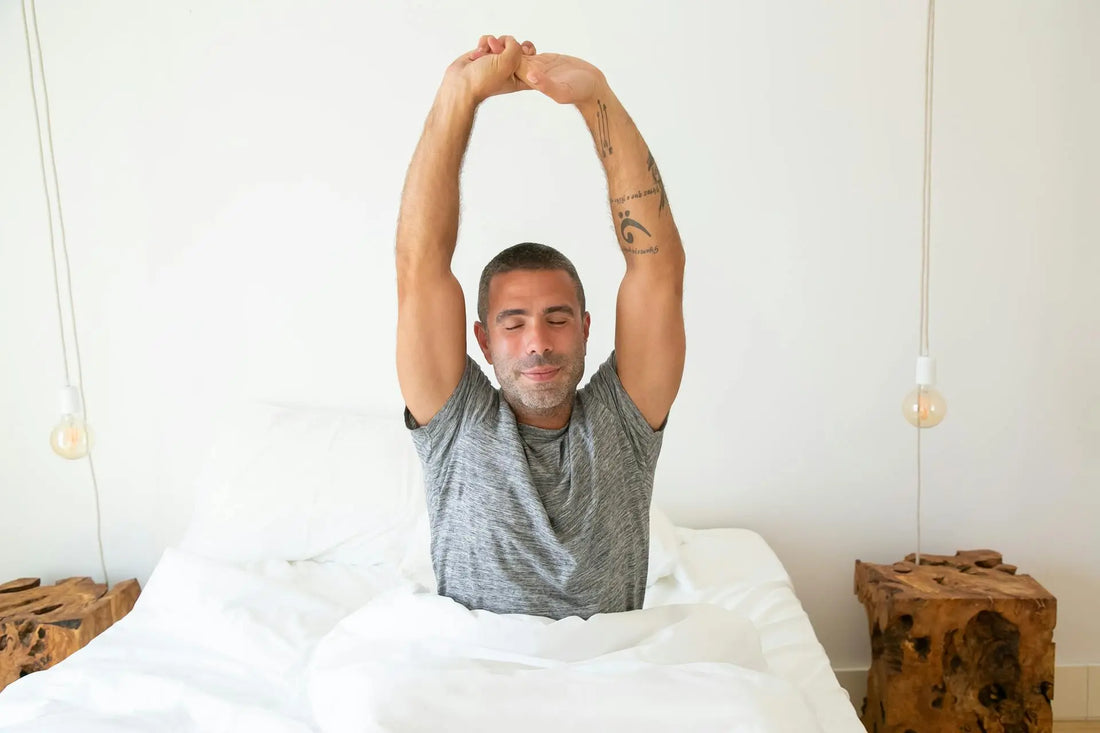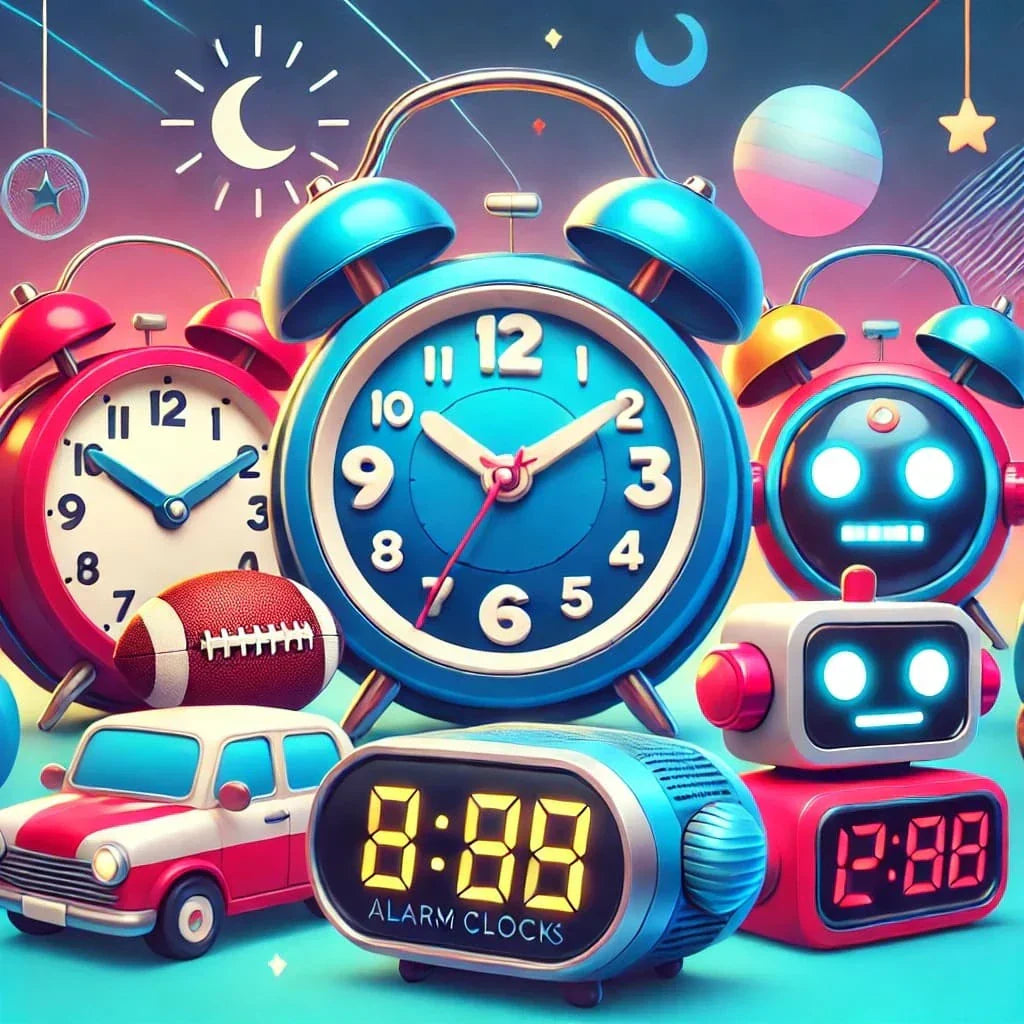
How to wake up in the morning?
The Best Ways to Wake Up Naturally
Whether you're a morning person or a night owl, it can be hard to leave the comfort of your bed in the morning. Find out what you can do to help your body wake up on its own .
Waking up is hard . Your bed is cozy . Your brain is foggy . And if you’re like many French people (more than a third, in fact), you’re already sleep deprived.
The snooze button is in high demand.
Scientists call this groggy period between sleep and wakefulness sleep inertia . According to the Centers for Disease Control and Prevention (CDC), it can last anywhere from 30 to 60 minutes, and sometimes longer. But for most of us with obligations to attend to (work, school, family), that’s too long to linger under the covers in a drowsy, half-awake state.
Even if you're never going to be someone who jumps out of bed in the morning, you can be someone who wakes up a little easier in the morning . We asked experts and scoured the scientific literature for tips on how to wake up when you're tired. Here's what we found.
How to wake up in the morning
Don't hit the snooze button
It may be tempting to wait an extra five minutes when you're feeling tired, but resist the urge to hit the snooze button. "This can actually do more harm than good," says Steven D. Bender, MD, director of the Clinical Center for Facial Pain and Sleep Medicine at Texas A&M Health. "First, the extra time (usually a few minutes) doesn't allow for restful sleep . Second, by delaying waking, we can accentuate or worsen sleep inertia. The more we try to sleep beyond our ideal sleep duration, the more likely we are to experience this phenomenon."

Wake up at the right time
Yes, there is a right time to get up, even if you don't necessarily get up at dawn.
The body goes through four stages of sleep throughout the night. Non-REM sleep , during which bodily functions such as heart rate, brain activity, and breathing slow down significantly, is the first sleep cycle and has three stages. The last stage of non-REM sleep produces one of the deepest sleeps of the night and typically lasts between 20 and 40 minutes. At the end of this stage, you enter REM sleep , and then return to non-REM sleep.
If you're unlucky enough to have your alarm go off during one of these deep sleep stages, you're likely to wake up feeling dazed and confused. Here's a better strategy: Try waking up during a lighter stage of sleep, such as the first cycle of non-REM sleep.
“Waking up from a light sleep rather than a deep sleep can make you feel more refreshed,” says Alon Y. Avidan, MD, director of the UCLA Sleep Disorders Center. “When you wake up from a deep sleep, you’re more likely to feel sedated or intoxicated.
It would be great if we could train ourselves to wake up in the morning during this light sleep, but Avidan says that’s not possible. What about wearable sleep trackers? Avidan says they may not be time-sensitive. “I haven’t seen any data that shows that these devices are reliable,” he says. “We may get there in a few years, but right now we’re not there yet. I think the best thing to do is to rely less on technology and more on good sleep hygiene (like sleeping in a cool, dark room) and getting enough sleep .”
If you are wondering about your ideal time, try calculating it.
Let the sun in
Sunlight (and darkness) helps set our circadian rhythm , a process by which the body sets its sleep and wake cycle. Sunlight streaming into your bedroom is like a natural alarm clock , signaling to your body that it’s time to start the day. The parts of the brain that help regulate the circadian rhythm are sensitive to signals of light and dark. When the eye, and then the brain, perceives morning sunlight, hormones like cortisol are released, helping you feel more awake.

How much light do you need? It depends, but experts stress that sunlight is better than artificial light.
“If you wake up feeling refreshed, the light shining into the room is enough,” says sleep psychologist Samina Ahmed Jauregui. “However, if you have trouble staying awake, 20 to 30 minutes of direct sunlight on your face will help decrease sleepiness and increase energy levels. ”
If you need to wake up before sunrise, consider using an alarm clock ( Explore our collection of dawn simulator alarm clocks ) that uses a light source that mimics morning light, changing from red to orange to white (these are called dawn simulator alarm clocks). While some sleep experts argue that these alarm clocks are more gimmick than science, at least one study shows that people exposed to the " dawn simulation " starting 30 minutes before waking felt more alert than those in a control group.
Drink water
Before you even think about coffee, drink water . Just like during the day, you lose water at night— through breathing , sweating, and urinating . This water loss, which is usually not replenished, can lead to dehydration .
But when you hydrate first thing in the morning and stay hydrated throughout the day, you may feel more awake and less sleepy . In one study of what researchers classified as heavy and light water drinkers, those in the light group who doubled their water intake (from 1.2 liters to 2.5, or about 40 fluid ounces to 84.5) reported significantly reduced fatigue, confusion, and sleepiness.
Play music
Research shows that people who wake up to melodic music (Good Vibrations by the Beach Boys and Close to Me by The Cure) versus neutral sounds (neither melodic nor melodic) have less trouble falling asleep. Researchers speculate that this may be because melodic music has an energizing effect, helping you get up and get going. Explore our music alarm clocks and smart alarm clocks to wake up to your favorite tunes.
Move
To get your mind moving, it helps to get your body moving. And we don't necessarily mean a five-mile run on the treadmill. In fact, exercising a few hours before bed has been shown to promote better sleep , according to sleep experts. Simply standing up, walking around, taking a shower (it doesn't have to be cold water), and making breakfast can help.
"As you transition from sleep to wakefulness, you want to get your blood flowing, such as by walking and getting your metabolism going (start with water and food before introducing coffee), all to signal to the brain and body that it's time to be awake and start the day," Jauregui says.
According to experts, the best energy-boosting breakfasts combine protein, fiber-rich whole grains, and healthy fats. Possible options include avocado toast with salmon or a smoothie with fruit, yogurt, peanut butter, wheat germ, etc.

Wait a while before drinking coffee
You've read it above, but it bears repeating: Don't reach for coffee first thing in the morning. Coffee is every sleepyhead's elixir. It helps block the release of adenosine, a chemical that builds up while we're awake and makes us feel tired. But before you head to Starbucks, many experts suggest waiting until midmorning to grab your coffee . That's when cortisol, a stress hormone your body naturally produces that helps you feel alert, begins to decline after peaking earlier in the day. That's also when the stimulant effects of the caffeine in coffee can give you the most bang for your buck .

Tips for waking up naturally and well rested
To wake up feeling refreshed, it's crucial to get a good night's sleep the night before, which includes practicing good sleep hygiene . Here's what experts recommend:
- Go to bed and wake up at regular times each day.
- Avoid heavy meals, caffeine and alcohol before bed.
- Maintain a comfortable sleeping environment, such as a dark, cool, and quiet bedroom.
- Keep electronic devices (TVs, phones, tablets, etc.) away from the bedroom.
If you follow these tips but still have trouble waking up in the morning, see your doctor. You may have a sleep disorder, such as sleep apnea or restless legs syndrome, that disrupts sleep and requires treatment.
"If, despite getting seven to eight hours of sleep, you feel constantly tired, never wake up feeling refreshed, or need multiple alarms to get up in the morning, these are signs that it's time to seek medical attention," says Dr. Avidan.
How to stay awake?
Now that you know how to wake up in the morning, it's important to know how to stay awake during the day.
The answer is simple : The same strategies you use to wake up in the morning will help you stay awake throughout the day. The only exception is coffee and caffeinated products : Coffee and caffeinated products. While they may be effective at getting you out of the afternoon slumber, they can keep you up at night . "I advise people not to consume caffeine after noon or one o'clock in the afternoon," Avidan says.






